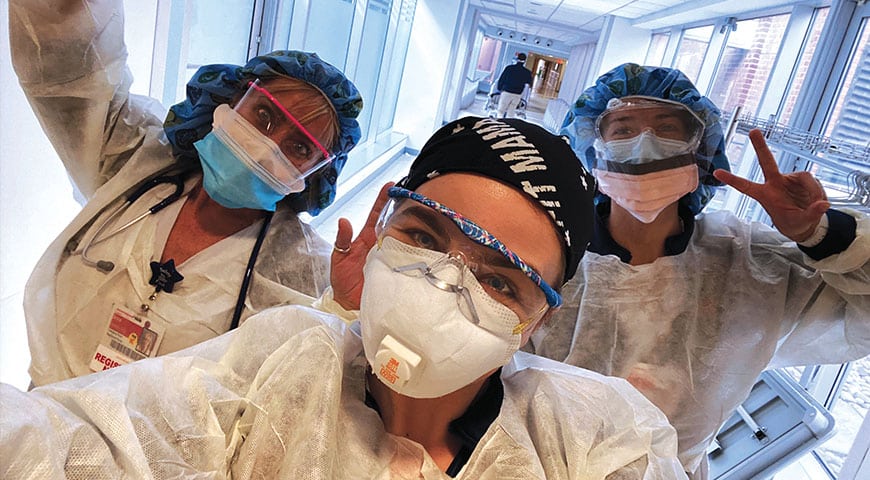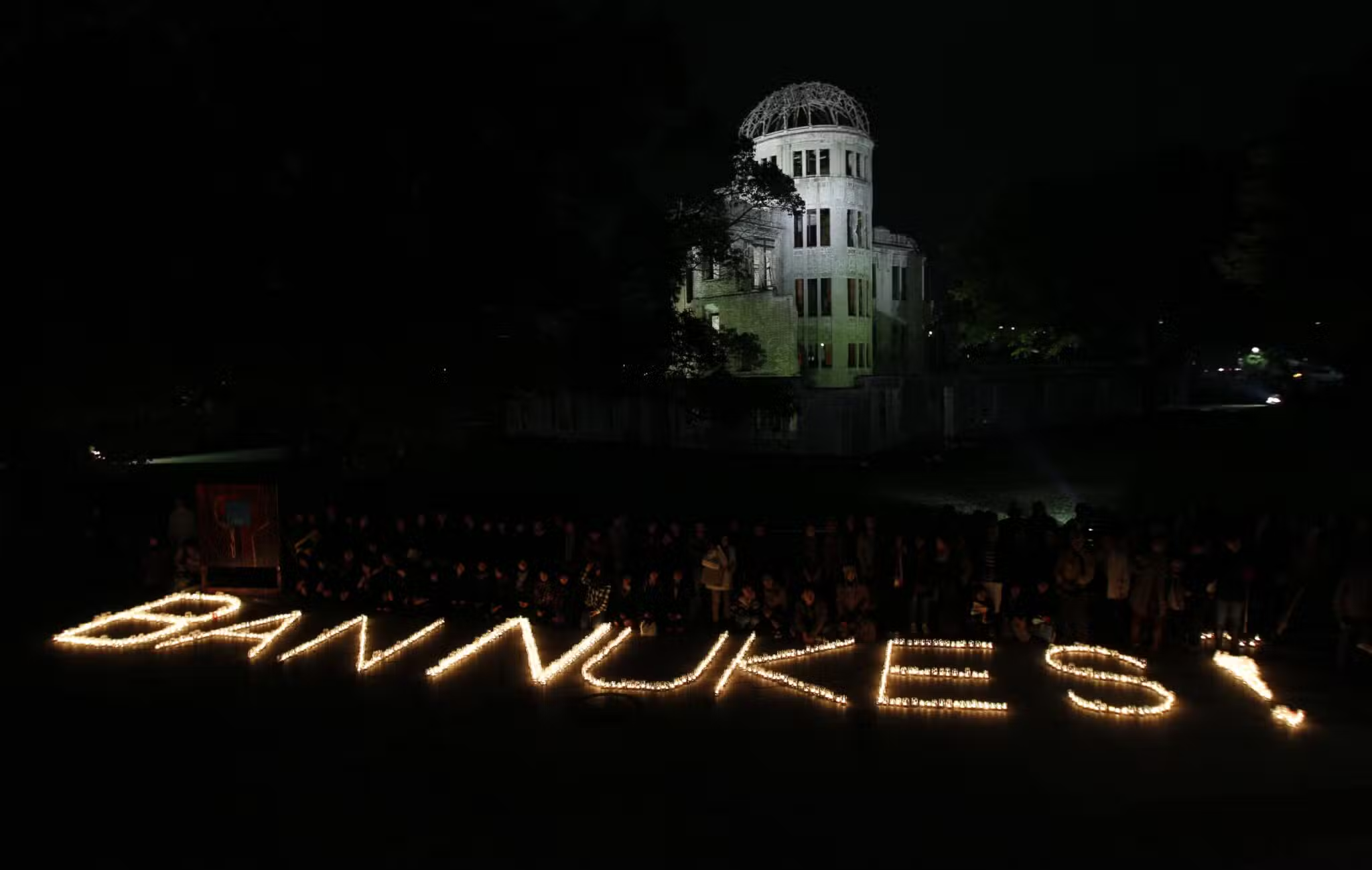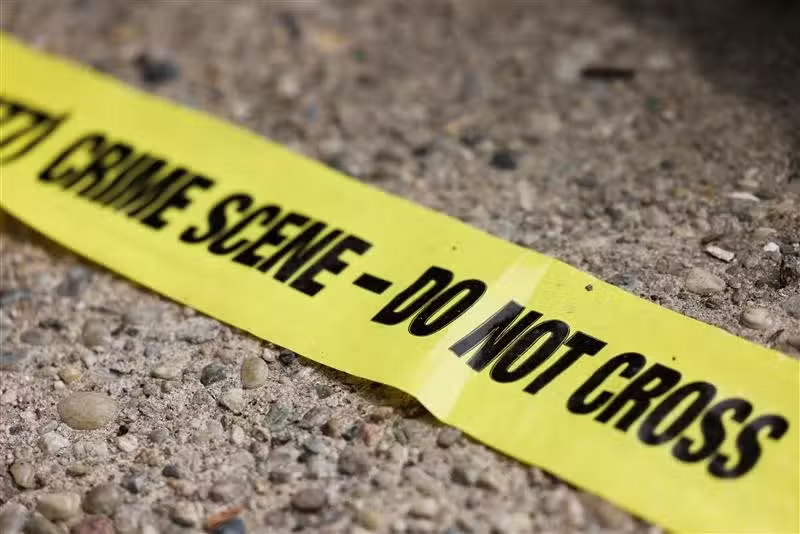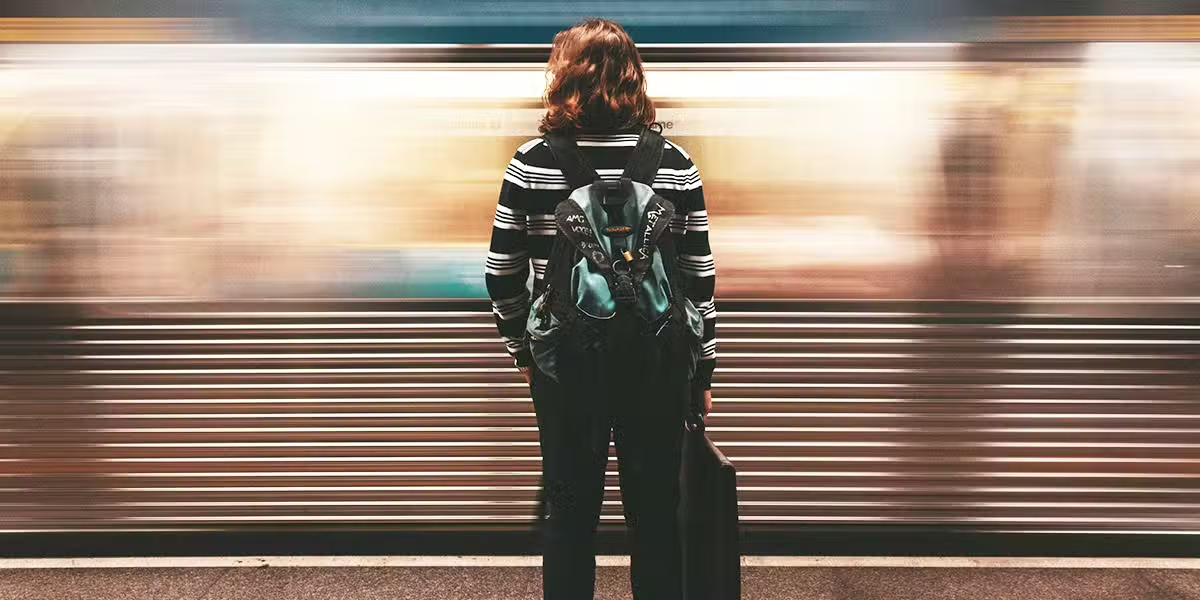A pair of nurses explain how their faith helped them cope with the unique challenges of caring for COVID-19 patients in New York City.
As the 2020 COVID-19 pandemic took hold around the world, health-care workers became international heroes. Pope Francis called them “the saints next door.” Videos featuring them in circumstances ranging from deeply tragic to profoundly inspirational appeared all over the media. Military fighter jets did flyovers of hospitals in their honor. Politicians, royalty, and celebrities stood shoulder to shoulder with regular citizens nightly in neighborhoods, applauding and cheering them on.
Nurses in particular were singled out for praise, and rightly so. All across our nation, nurses did not hesitate to answer the clarion call to serve, to be and bring Jesus to the suffering, despite the danger to their own lives as well as to those of their loved ones. Working alongside nurses, hospital chaplains responded to the spiritual needs of patients with grace and courage.
Two nurses share their stories from the front lines of the pandemic.
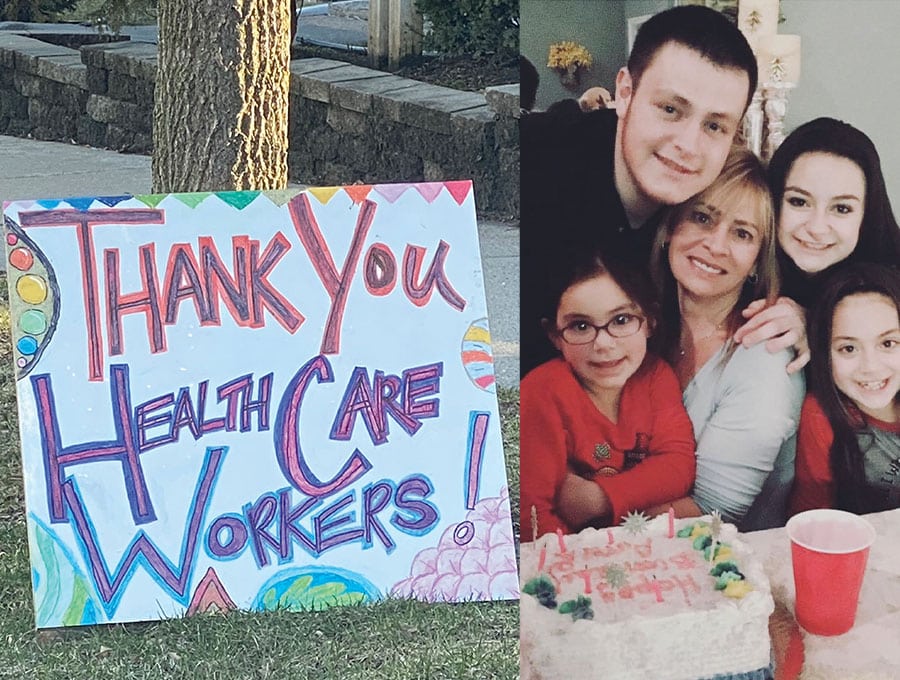
Nurse Anna Pedote says: “I remember one COVID patient I was caring for telling me he couldn’t breathe. I immediately told him to lie on his stomach and proceeded to cup and clap his back for what seemed like an eternity. When he started feeling better and his blood oxygen level increased, I was able to stop for a few moments—until I realized I had eight more patients just like him that needed my attention. There was never enough of me to go around.” Pedote, an emergency room nurse for 16 years, continues, “I became a nurse to help people, to ease their suffering, but COVID-19 just would not let me.”
All the city’s health-care workers were hailed as heroes, but none more so than the thousands of hospital nurses who became the front line for the COVID-19 war starting in late February. Recalls Pedote: “The plan that was put in place was to have the nurses screen patients. If they met the COVID-19 criteria—fever, shortness of breath, cough—we would give them a mask, place a mask on ourselves as well, and escort them to an isolation room. The nurse would then don personal protective equipment and go into the isolation room. Most contact with physicians was done via telephone. We, the nurses, were the ones with the patient the whole time. If patients were negative, they would go home. If not, the CDC [Centers for Disease Control] was called for further instructions.”
New York City, the Big Apple, the City That Never Sleeps, started to shut down. Remembers Pedote: “Airports, train stations, businesses, and schools were all closing. It seemed as if overnight my hospital became like a MASH unit. There were patients in beds and on gurneys everywhere, including in our cafeteria. A tent had been set up outside the ER for less seriously ill patients. We had nurses from every unit flowing into the ER to help us.
“Nurses from other hospitals around the city—and eventually the nation—were brought in to help. The patients we saw would go from bad to worse and sometimes to dying in just a matter of hours. It was a full-time job just to keep replenishing oxygen tanks.”
This same scenario played out daily in Pedote’s life for months, and she could not help but be affected. “I would come home late at night crying. It was impossible to decompress, to sleep more than just a short time. I know that it was only God who gave me the strength to continue. I would pray every morning before going in that God would be with me and give me what I needed to get through another day, to help me help these very sick people.”
It was only normal that Pedote was afraid to be around so many sick patients, but she never hesitated to return every day to the ER. “That’s my job, and it’s what I do and what I want to do,” she says. “The worst part for me was that no one really wanted to be around me. Friends, family were all afraid. I totally understand, but that was hard.”
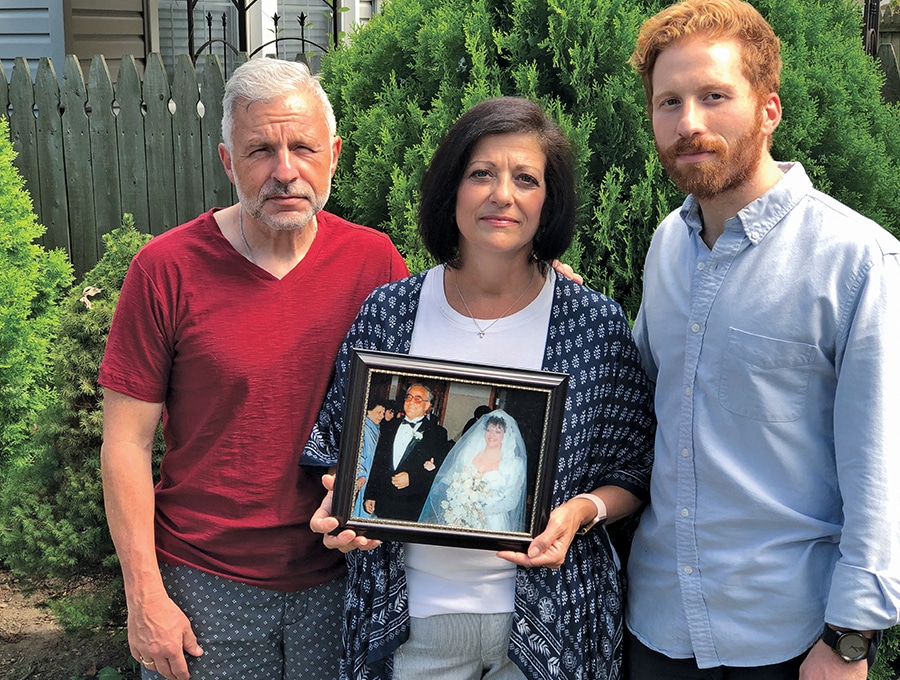
“We received our first positive patient in mid-March,” remembers Lea Vischio, a labor and delivery nurse in New York City for 35 years. “She was in labor with mild COVID-19 symptoms. I held up her baby from across the room so she could see, then transferred the baby to the nursery. Mom and baby were only united upon discharge days later.” A mother of three herself, Vischio could empathize with the new mother’s suffering. “She was not able to hold, hug, or kiss her newborn. It was the complete opposite of what’s usually done after a birth. I could feel the emotional pain this first-time mother was experiencing. COVID-19 turned something that should be so beautiful into something so cruel and unnatural.”
While the COVID-19 virus hit different parts of New York City to varying degrees, every hospital was over capacity. Hospitals were limited to only patients and employees. “I realized this was going to be something serious when they started to ban visitors,” recalls Vischio. “Every floor had become a COVID floor, and units were closed off from traffic. You weren’t allowed to be on a unit unless you worked there, no matter who you were.”
For Vischio, COVID-19 became a battle on both the work front and the home front. On March 27, while working at the hospital, she received a call from her sister that they were bringing their father to the emergency room because he was having trouble breathing.
“When my father was brought to the ER, I did not suspect COVID-19,” she recalls. “He hadn’t been exhibiting any symptoms, and I just thought, at 86 years old, he was experiencing another bout of congestive heart failure. I wasn’t allowed into the ER but was able to find out that he had indeed tested positive for COVID-19. Later that evening after my shift, I was able to secure permission to see him. I had to put on full PPE [personal protective equipment] and was allowed only a few minutes with him. Leaving him that night was one of the most difficult things I’ve ever had to do. Not being able to be with him or even involved with his care was and still is extremely difficult for me to come to terms with.”
Her father declined rapidly, succumbing to COVID-19 only three days later, leaving Vischio and her family bereft with little ability to take comfort in their treasured faith rituals. All the Roman Catholic dioceses had ordered their churches and cemeteries closed; the deceased were being housed by undertakers in special refrigerated trucks or warehouses for weeks before they could be dealt with properly.
“Being a devout Catholic family, it was and still is awful not having been able to grieve in our traditional way,” reflects Vischio. “My father was a founding pillar of our parish and community. There was no wake where we could share hugs and stories and memories with friends and family. There was no spiritual closure from having the Mass of Christian Burial in the manner in which we knew.”
Vischio’s situation grew worse when, five days after her father’s death, she herself exhibited symptoms of COVID-19. “I got swabbed and I was positive, although I never really had any doubt. I locked myself in my room, and my husband would leave food at the door.”
Other family members, including her mother and sister, who had been exposed to her father prior to his hospitalization, also contracted the virus, though Vischio experienced the most serious case. “There were some benefits to being a nurse and having COVID-19,” she says. “I was able to monitor my vital signs, oxygen saturation, and perform breathing exercises. But it also proved to be very anxiety-provoking. There was the constant fear of your condition worsening and, of course, the possibility of ending up on a ventilator. While I did have some serious moments that brought me to the very hospital in which I worked for my own treatment, I was able to avoid the ventilator. “
She smiles as she remembers: “I also knew there were lots of prayers being said for my recovery. I have a cousin, Rev. Nick Mormando, OFM Cap, at the Franciscan Friary of St. Pio in Fort Lauderdale, Florida, and I think he had every province praying for me. You cannot imagine how comforting it is to know that people are praying for you.”
Carrying Out the Mission of Christ
The COVID-19 experiences of these two nurses are a microcosm of what the vast majority of the nation’s nearly 3 million registered nurses had to face as the deadly virus marched across the United States, filling hospitals coast to coast and border to border. Confirmed US cases swelled to over 7 million by the end of September, with more than 205,000 deaths attributed to the virus. The same scenes of the frantic fight between life and death that first appeared in New York City hospitals reappeared state by state, city by city, town by town, as the epicenter of the virus changed frequently.
Talk of a COVID-19 vaccine is heartening, but many variables and questions remain. Today, Pedote and Vischio are working under more normal circumstances than during the period from March to August. Pedote can still see every patient by whose side she stood as she provided them with treatment, or held their hand as they gasped for air, or who asked her to call their family or say a prayer with them. Vischio thanks God every day for bringing her through her own battle with COVID-19 and waits for the day in 2021 when she and her family can have their father’s funeral Mass and give him the send-off he deserves.
New front lines of nurses and other health-care workers queue up every day, ready to engage in and bear witness to the mission of Jesus the healer. “You are an image of the Church as a ‘field hospital’ that continues to carry out the mission of Jesus Christ, who drew near to and healed people with all kinds of sickness and who stooped down to wash the feet of his disciples,” says Pope Francis. “Let us pray for nurses.”
Her husband, John, says of that time: “My greatest concern was that her personal life and professional life were colliding. She barely had a moment to realize what happened to her father when she became infected herself. There was no room to breathe, emotionally or physically.” Also pictured is the couple’s youngest child, Adam Angelo, 27, named in honor of his grandfather.
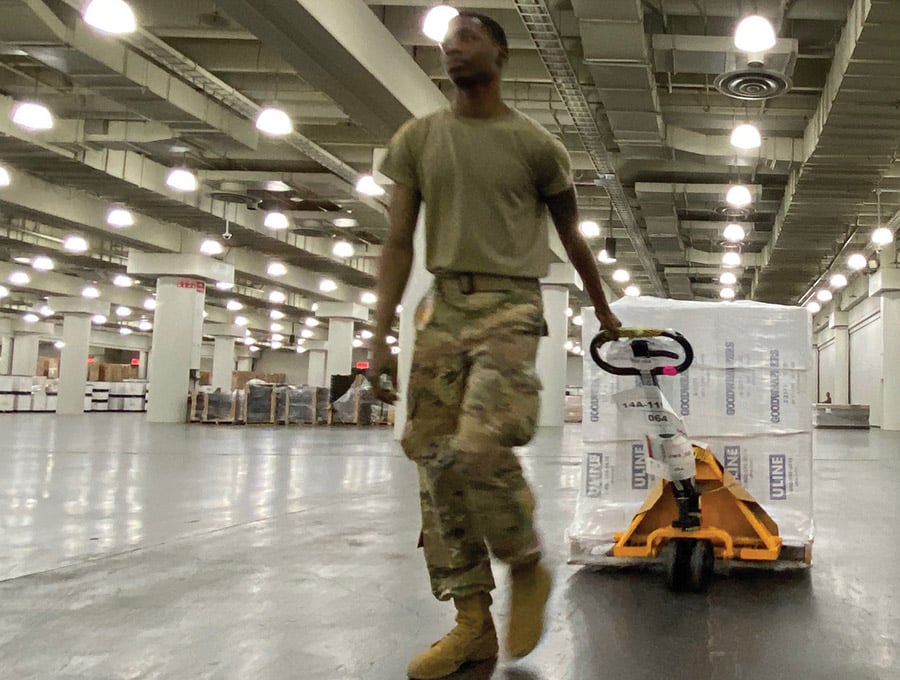
New York Stats
With nearly 489,000 confirmed cases of COVID-19 and more than 32,900 deaths tallied by October, New York City has been the nation’s hardest hit location. Fatalities from the virus rose to 800 per day during April and May. Its high rate of transmission overwhelmed the state’s health-care facilities, both public and private, and the city’s 200-plus hospitals and urgent care centers quickly overflowed with seriously ill patients of all demographics.
The hospital ship USN Comfort was dispatched to the New York City waterfront, convention centers were converted into hospitals, and hotels and state university dormitories were outfitted for less serious cases. Samaritan’s Purse, a nondenominational Christian organization providing spiritual and physical aid to the sick around the world, set up a 14-tent, 68-bed field hospital in the city’s famed Central Park, just across from Mt. Sinai Hospital Center.
Sister Preenika Dabrera, CSJ, Pastoral Minister
A member of the Congregation of the Sisters of St. Joseph, Brentwood, New York, Sister Preenika Dabrera, CSJ, works as a pastoral care minister at St. Catherine of Siena Medical Center, a Catholic hospital on Long Island. By the time COVID-19 arrived in New York in early March, Sister Preenika was already aware of the devastating virus from conversations with her family in Sri Lanka.
“My family knew of the virus much earlier than we did, and they kept warning us here to expect much devastation,” she says. “That was in January, and by the end of February they canceled their plans to come visit me, but here in America we were still going about our lives in the normal way.”
In her normal routine as a chaplain, Sister Preenika would provide the spiritual component of the healing process to both patients and their families. Every day, she freely visited patients, offering spiritual direction, counseling, prayer, conversation, the Eucharist, and often just a hand to hold.
That all changed when COVID-19 arrived. “We could no longer see the patients or walk through the units. Every floor was limited to just the doctors and nurses who worked on that unit,” explains Sister Preenika. “The nursing home next to the hospital was completely sealed off to volunteers and visitors.” As the hospital filled with seriously ill patients, she and the other ministerial staff were prohibited from actually being with patients. “We had to minister to the patients over the phone,” she says.
“The nurses were so good about staying with the patient, holding the phone so they could see or hear us as we prayed with the patient or spoke with them. When someone needed anointing, the priest was only allowed to stand by the door and say the prayers, and the nurses would wheel the patient’s bed as close to the door as possible.”
Such a deviation from the intimate, personal nature of pastoral care was difficult. “I found it very upsetting,” says Sister Preenika. “It was so hard to try to comfort patients over the phone, and it was difficult to end the calls.” Dealing with such serious sickness, stress, and sorrow every minute of the day had a profound impact upon Sister Preenika. The community of sisters with whom she lived provided the support she needed to continue serving the needs of the hundreds of seriously ill patients.
“The sisters were there for me every day. Without hearing patients’ personal or family info, they listened to my stories of the patients, and they held each of them in prayer. We did little fun activities together. When we watched movies together, they made sure to choose films without violence or hospitals. They made my favorite foods to cheer me up. And we ate lots of ice cream,” she laughs.
“They also gave me lots of space to stay in silence and pray so I could renew my spirit and energy. I appreciated that because I needed time alone to process the hard things patients, family, and staff shared with me.”
Though today Sister Preenika is engaged in more of the usual ministry activities she enjoyed before COVID-19, she will always remember all those whom God brought to her to touch.
“I will forever hold in prayer every patient and family with whom I spoke and prayed and comforted,” she says softly.


